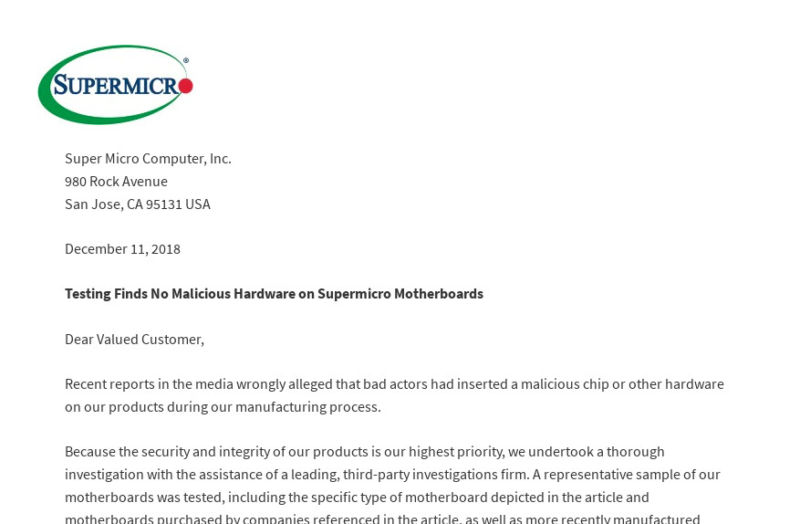Audit: No Chinese surveillance implants in Supermicro boards found

Enlarge / A letter posted by Supermicro executives today announcing that an audit had found no evidence of claims of espionage implants in the company’s servers, part of a campaign by the company to counter a report by Bloomberg in October.
In a letter to customers issued December 11, Supermicro President and CEO Charles Liang and other top executives announced that an audit conducted by an outside investigating team had found no evidence of any malicious hardware incorporated into motherboards currently or previously manufactured by the company. The letter is the latest rebuttal to Bloomberg reports in October that claimed tiny chips that provided a backdoor for China’s intelligence agencies had been integrated into boards provided to major Internet and cloud providers—a report also refuted by the companies the report claimed were targeted.
“After a thorough examination and a range of functional tests, the investigative firm found absolutely no evidence of malicious hardware on our motherboards,” the letter signed by Liang, Supermicro Senior Vice President and Chief Compliance Officer David Weigland, and Senior VP and Chief Product Officer Raju Penumatcha stated. “These findings were no surprise to us… We appreciate the industry support regarding this matter from many of our customers, like Apple and AWS. We are also grateful for numerous senior government officials, including representatives of the Department of Homeland Security, the director of National Intelligence, and the director of the FBI, who early on appropriately questioned the truth of the media reports.”
Reuters’ Joseph Menn reported that the audit was apparently undertaken by Nardello & Co, a global investigative firm founded by former US federal prosecutor Daniel Nardello. According to Reuters’ source, the firm examined sample motherboards that Supermicro had sold to Apple and Amazon, as well as software and design files for products. No malicious hardware was found in the audit, and no beacons or other network transmissions that would be indicative of a backdoor were detected in testing.
Read 3 remaining paragraphs | Comments